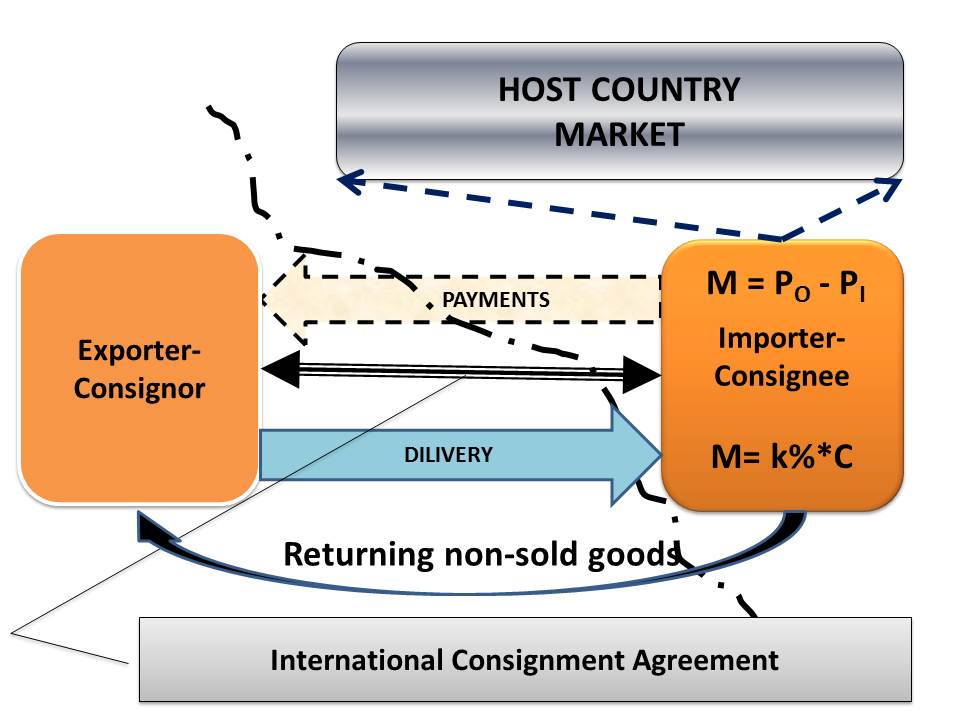International Consignment Agreement
From Supply Chain Management Encyclopedia
(/* Pattern Structure and Check-List for Designing International Consignment Agreement Compiled from the data from: Auerbach, R.Consignment Agreement Checklist, July 2003 - www.marketnewzealand.com/checklists. This article is construcned as a conversa) |
|||
| Line 15: | Line 15: | ||
* in the case of returnable consignment (М = k*C = COMISSION INTEREST * COST OF CONSIGNMENT PRODUCT SOLD). | * in the case of returnable consignment (М = k*C = COMISSION INTEREST * COST OF CONSIGNMENT PRODUCT SOLD). | ||
| - | == '''Pattern Structure and Check-List for Designing International Consignment Agreement'''<ref> Compiled from the data from: Auerbach, R.Consignment Agreement Checklist, July 2003 - www.marketnewzealand.com/checklists. This article is construcned as a conversation between a consultant and Consignor who is going to conclude an International Consignment Agreement with a | + | == '''Pattern Structure and Check-List for Designing International Consignment Agreement'''<ref> Compiled from the data from: Auerbach, R.Consignment Agreement Checklist, July 2003 - www.marketnewzealand.com/checklists. This article is construcned as a conversation between a consultant and Consignor who is going to conclude an International Consignment Agreement with a possible Consignee. </ref> == |
| + | |||
| + | '''1. Definitions''' | ||
| + | |||
| + | * 1.1. “Consignee” refers to the customer who receives the Consignment Stock subject to the terms of the Consignment Agreement. | ||
| + | * 1.2. “Consignment Stock” refers to the manufacturer’s (reseller’s) products that are the subject of the Consignment Agreement. | ||
| + | * 1.3. “Consignor” refers to the manufacturer whose products are the subject of the Consignment Agreement. | ||
==References== | ==References== | ||
Revision as of 23:09, 11 November 2014
Russian: Международное консигнационное соглашение
Consignment in international trade is a variation of the open account method of payment in which payment is sent to the exporter only after the goods have been sold by the foreign distributor to the end customer[1]. An international consignment transaction is based on a contractual arrangement in which the foreign distributor receives, manages, and sells the goods for the exporter who retains title to the goods until they are sold. Payment to the exporter is required only for those items sold. One of the common uses of consignment in exporting is the sale of heavy machinery and equipment because the foreign distributor generally needs floor models and inventory for sale. Goods not sold after an agreed upon time period may be returned to the exporter at cost. Exporting on consignment is very risky as the exporter is not guaranteed any payment and someone outside the exporter’s control has actual possession of its inventory. However, selling on consignment can provide the exporter some great advantages which may not be obvious at first glance. For example, consignment can help exporters compete on the basis of better availability and faster delivery of goods when they are stored near the end customer. It can also help exporters reduce the direct costs of storing and managing inventory, thereby making it possible to keep selling prices in the local market competitive. However, though consignment can definitely enhance export competitiveness, exporters should keep in mind that the key to success in exporting on consignment and in getting paid is to partner with a reputable and trustworthy foreign distributor or a third-party logistics provider.
Simplified Scheme of Relationship of Parties in International Consignment Agreement
LEGEND:
- in the case of non-returnable consignment (М = PO – PI = OUTBOUND PRICE – INBOUND PRICE);
- in the case of returnable consignment (М = k*C = COMISSION INTEREST * COST OF CONSIGNMENT PRODUCT SOLD).
Pattern Structure and Check-List for Designing International Consignment Agreement[2]
1. Definitions
- 1.1. “Consignee” refers to the customer who receives the Consignment Stock subject to the terms of the Consignment Agreement.
- 1.2. “Consignment Stock” refers to the manufacturer’s (reseller’s) products that are the subject of the Consignment Agreement.
- 1.3. “Consignor” refers to the manufacturer whose products are the subject of the Consignment Agreement.
References
- ↑ Chapter 6: Consignment - http://www.export.gov/tradefinanceguide/eg_main_043248.asp
- ↑ Compiled from the data from: Auerbach, R.Consignment Agreement Checklist, July 2003 - www.marketnewzealand.com/checklists. This article is construcned as a conversation between a consultant and Consignor who is going to conclude an International Consignment Agreement with a possible Consignee.





